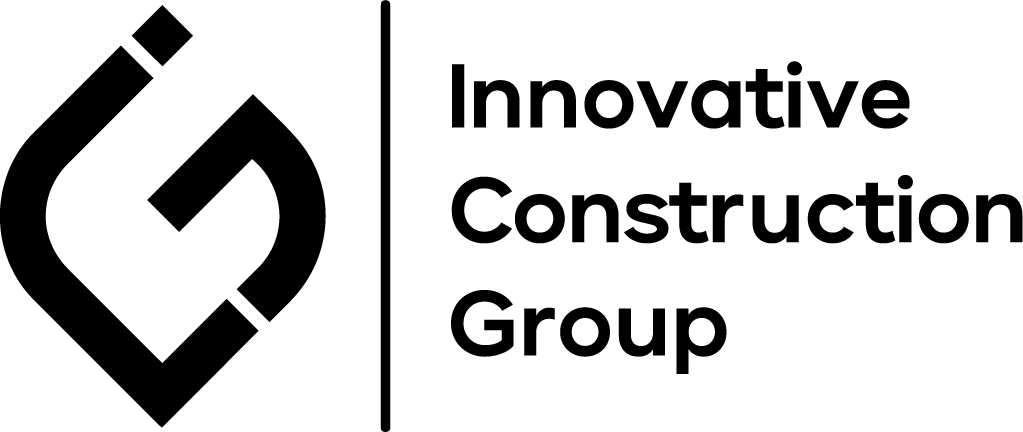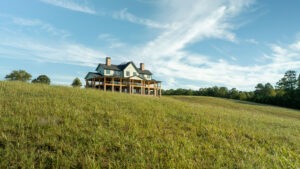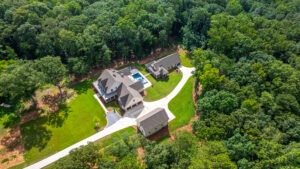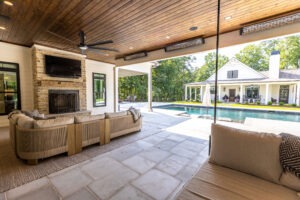Building a dream residence in Georgia can be a thrilling experience, but it’s not without its challenges. Many individuals face unforeseen difficulties when constructing their ideal abode. In this article, we’ll explore the top 7 pitfalls to avoid when creating your perfect haven in the Peach State.

From selecting the ideal location to managing your budget effectively, we’ll guide you through the process. By understanding the common errors people make, you’ll be better equipped to navigate the complexities of constructing your dream residence.
Key Takeaways
- Avoid choosing the wrong location for your residence.
- Effectively manage your budget to prevent cost overruns.
- Select a reliable construction team.
- Plan for future needs and potential changes.
- Ensure compliance with local building regulations.
- Consider energy efficiency and sustainability.
- Prepare for potential delays and have a contingency plan.
Understanding Georgia’s Custom Home Building Market
To successfully build a custom home in Georgia, it’s essential to grasp the current market trends and unique challenges. The custom home building market in the state is influenced by a variety of factors, making it crucial for homeowners to be well-informed.
Current Market Trends
The demand for custom homes in Georgia is on the rise, driven by homeowners seeking unique, tailored living spaces. This trend is expected to continue, with a focus on energy-efficient homes and smart home technology. Some key trends include:
- Increased demand for sustainable building materials
- Growing popularity of open floor plans
- Integration of smart home features
Unique Challenges in Georgia’s Housing Market
Despite the growing demand, there are unique challenges to building a custom home in Georgia. These include seasonal considerations and regional price variations.
Seasonal Considerations
Georgia’s climate varies significantly throughout the year, with hot summers and mild winters. This can impact construction timelines, particularly during the summer months when weather conditions can be challenging.
Regional Price Variations
The cost of building a custom home in Georgia can vary significantly depending on the region. Factors such as land prices, labor costs, and local building regulations contribute to these variations. For instance, building in urban areas like Atlanta may be more expensive than in rural areas.
Why Building a Custom Home in Georgia Requires Special Consideration
When building a custom home in Georgia, it’s crucial to understand the state’s unique environmental and regulatory challenges. Georgia’s climate varies significantly across different regions, with hot and humid summers, mild winters, and occasional severe weather events.
Climate and Environmental Factors
Georgia’s diverse climate and environmental factors play a significant role in custom home construction. The state’s coastal regions are prone to hurricanes and flooding, while the northern parts experience colder winters. Understanding these factors is essential to designing and building a home that can withstand the local climate conditions.
Regional Building Regulations
Regional building regulations in Georgia are not uniform and vary by county and municipality. Compliance with these regulations is crucial to avoid costly mistakes and ensure that the home is built to last.
County-Specific Requirements
Each county in Georgia has its own set of building codes, zoning laws, and environmental regulations. For instance, counties near the coast may have stricter building codes to mitigate hurricane damage.
State Building Codes
Georgia has adopted the International Building Code (IBC) and the International Residential Code (IRC) with some state-specific amendments. Understanding these codes is vital for custom home builders to ensure compliance and avoid potential legal issues.
| Regulation Type | Description | Impact on Custom Home Building |
|---|---|---|
| County-Specific Requirements | Varying building codes and zoning laws by county | Affects design and construction to comply with local regulations |
| State Building Codes | Adoption of IBC and IRC with state amendments | Ensures compliance with statewide building standards |
By understanding and adhering to these regulations, custom home builders in Georgia can avoid common construction errors and ensure their projects are successful.
Mistake #1: Choosing the Wrong Location and Property
The process of building a custom home in Georgia begins with a critical decision: selecting the right property. This choice will significantly impact your quality of life, the functionality of your home, and its overall value. Choosing the wrong location can lead to a myriad of problems, from zoning issues to environmental concerns.
Overlooking Zoning Restrictions
One of the most common mistakes is overlooking zoning restrictions. These regulations can dictate everything from the size and height of your home to the types of activities you can conduct on the property. Ensuring that your property is zoned for your intended use is crucial to avoid costly modifications or even legal issues down the line.
Ignoring Soil Quality and Topography
Ignoring soil quality and topography is another significant error. Poor soil conditions can lead to foundation problems, while a challenging topography can increase construction costs. Conducting thorough soil tests and assessing the land’s topography can help you anticipate and mitigate these issues.
Failing to Research Neighborhood Development Plans
Failing to research neighborhood development plans can result in unforeseen changes to your surroundings. New developments or infrastructure projects nearby can impact your home’s value and your quality of life. Staying informed about local development plans can help you make a more informed decision about your property.
By carefully evaluating these factors, you can avoid common custom home building mistakes in Georgia and ensure that your custom home is perfectly situated. Whether you’re looking to build a modern estate or a cozy retreat, choosing the right location is the first step towards making your dream a reality.
Mistake #2: Inadequate Budgeting and Financial Planning
One of the most significant errors in custom home building is failing to create a comprehensive budget. Building a custom home in Georgia requires careful financial planning to avoid costly mistakes.

Underestimating Total Construction Costs
Underestimating the total cost of construction can lead to financial strain. It’s crucial to accurately estimate costs, considering factors like materials and labor.
Material Cost Fluctuations
Material costs can fluctuate due to market demand and supply chain issues. A flexible budget can help mitigate these fluctuations.
Labor Expenses in Different Georgia Regions
Labor costs vary across different regions in Georgia. Researching local labor expenses can help in creating a more accurate budget.
Forgetting to Budget for Unexpected Expenses
Unexpected expenses can arise during construction. It’s wise to allocate a portion of the budget for unforeseen costs, ensuring the project stays on track.
“A well-planned budget is the backbone of any successful construction project.” –
Industry Expert
Neglecting Permit and Impact Fees Specific to Georgia
Permit and impact fees can significantly add to the overall cost. Understanding and budgeting for these fees, which vary by location within Georgia, is essential.
By creating a comprehensive budget that accounts for total construction costs, unexpected expenses, and specific fees, you can avoid financial pitfalls and ensure your custom home building project is successful.
Mistake #3: Hiring Inexperienced or Unqualified Contractors
In the complex process of building a custom home in Georgia, hiring an experienced contractor is paramount. The right contractor can make a significant difference in the quality and timeliness of your project.
Not Verifying Licenses and Insurance
One of the initial steps in hiring a contractor is to verify their licenses and insurance. Failing to do so can expose you to significant risks, including potential legal and financial liabilities. Ensure that your contractor is properly licensed by the state of Georgia and has the necessary insurance coverage.
Skipping Reference Checks
Skipping reference checks can lead to hiring an unqualified contractor. It’s crucial to ask for references and follow up on them to gauge the contractor’s work quality, reliability, and professionalism. This step can save you from potential headaches down the line.
Failing to Confirm Experience with Georgia Building Codes
Georgia has specific building codes that contractors must adhere to, including residential code compliance and energy code requirements.
Residential Code Compliance
Residential code compliance ensures that your home is built to safe standards, including structural integrity and fire safety. Confirm that your contractor is well-versed in these codes to avoid costly rework.
Energy Code Requirements
Energy code requirements are designed to make your home energy-efficient, reducing utility bills and environmental impact. A contractor familiar with these requirements can help you achieve a more sustainable home.
By thoroughly vetting potential contractors and confirming their experience with Georgia building codes, you can ensure that your custom home is built to the highest standards, avoiding the costly mistake of hiring inexperienced or unqualified contractors.
Mistake #4: Poor Communication and Contract Management
To avoid common pitfalls in custom home building, it’s essential to prioritize clear communication and thorough contract management. Effective communication helps ensure that all parties involved in the project are on the same page, reducing the likelihood of misunderstandings and errors.

One of the key areas where poor communication can have significant consequences is in the contract itself. Vague contract terms can lead to confusion and disputes down the line. It’s crucial to have a comprehensive contract that outlines the scope of work, timelines, and payment schedules clearly.
Vague Contract Terms
Avoiding vague contract terms requires careful drafting and negotiation. Ensure that the contract includes specific details about the materials to be used, the construction timeline, and the process for handling changes or unexpected issues.
Insufficient Documentation of Changes
Changes are inevitable in any construction project. However, insufficient documentation of these changes can lead to disputes and delays. It’s essential to maintain a detailed record of all changes, including the reasons for the change, the impact on the timeline and budget, and any agreements or approvals obtained.
Lack of Regular Progress Meetings
Regular progress meetings are vital for keeping the project on track. These meetings provide an opportunity to discuss any issues, review progress, and plan for the upcoming work. A lack of regular progress meetings can result in missed deadlines and unexpected issues.
By focusing on clear communication and robust contract management, you can mitigate the risks associated with custom home building in Georgia. This proactive approach helps ensure that your project is completed on time, within budget, and to your satisfaction.
Mistake #5: Overlooking Energy Efficiency in Georgia’s Climate
Georgia’s hot summers and mild winters make energy efficiency a key factor in custom home construction. Overlooking this aspect can lead to increased energy bills and discomfort. Energy-efficient design elements are crucial for maintaining a comfortable living environment while minimizing energy consumption.
Inadequate Insulation for Hot Summers
Insufficient insulation can cause homes to absorb heat, leading to higher cooling costs. Proper insulation is essential for keeping homes cool during Georgia’s hot summers. It is recommended to use high-quality insulation materials that can withstand the state’s climate conditions.
Inefficient HVAC Systems
Inefficient HVAC systems can further exacerbate energy consumption issues. Regular maintenance and upgrading to energy-efficient systems can significantly reduce energy bills. Homeowners should consider investing in smart thermostats and high-efficiency HVAC systems.
Missing Opportunities for Solar Integration
Georgia’s sunny climate makes it an ideal location for solar energy integration. Solar panels can significantly reduce energy costs and provide a sustainable energy solution. Homeowners can benefit from tax incentives and a potential increase in property value.
Tax Incentives in Georgia
Georgia offers tax incentives for homeowners who invest in energy-efficient features, including solar panels. These incentives can help offset the initial investment costs.
ROI on Energy Investments
Investing in energy-efficient features can provide a significant return on investment. Homeowners can expect to save on energy bills and potentially increase their property’s value.
| Energy-Efficient Feature | Benefits | Cost Savings |
|---|---|---|
| Proper Insulation | Reduced heat absorption, lower cooling costs | Up to 30% on energy bills |
| Efficient HVAC Systems | Lower energy consumption, reduced bills | Up to 25% on energy bills |
| Solar Panels | Renewable energy source, reduced energy costs | Up to 50% on energy bills |
Mistake #6: Common Custom Home Building Mistakes in Georgia
The humid climate and varied soil types in Georgia make certain custom home building mistakes more prevalent. Homeowners and builders must be aware of these common mistakes to avoid costly repairs and ensure the longevity of the home.
Structural Issues Prevalent in Georgia Homes
Georgia homes are prone to specific structural issues due to the state’s climate and soil conditions. Poorly designed or constructed foundations can lead to significant problems, including cracks in walls and floors. Regular inspections and adherence to local building codes can help mitigate these issues.
Moisture Control Problems in Georgia’s Humid Climate
Moisture control is a critical concern in Georgia’s humid climate. Excess moisture can lead to mold growth, wood rot, and other structural issues. Effective moisture control strategies include proper insulation, ventilation, and waterproofing.
Basement Waterproofing Considerations
Basement waterproofing is essential in Georgia homes to prevent water intrusion and damage. This can be achieved through the use of waterproof membranes, proper drainage systems, and sealing any cracks or gaps in the foundation.
Mold Prevention Strategies
Preventing mold growth requires a multi-faceted approach, including controlling humidity levels, ensuring good ventilation, and promptly addressing any water leaks or damage. Using mold-resistant materials in construction can also help.
Foundation Considerations for Georgia Soil Types
Georgia’s varied soil types, from clay to sandy soils, require different foundation considerations. Understanding the soil type and its characteristics is crucial for designing a foundation that can support the home’s weight and withstand environmental factors.
| Soil Type | Foundation Considerations |
|---|---|
| Clay Soil | Requires deeper foundations to reach stable soil; may need specialized footings to handle expansive clay. |
| Sandy Soil | May require wider footings to distribute the weight; drainage solutions to prevent erosion. |
| Rocky Soil | Can support shallower foundations; may require blasting or specialized drilling for footings. |
By understanding and addressing these common custom home building mistakes in Georgia, homeowners can ensure their dream home remains structurally sound and comfortable for years to come.
Mistake #7: Poor Timing and Schedule Management
One of the most significant custom home building mistakes in Georgia is poor timing and schedule management. Effective project management is crucial to avoid delays and cost overruns.
When building a custom home in Georgia, it’s essential to consider the state’s weather patterns. The hot and humid summers can impact construction timelines, making it vital to plan accordingly.
Not Accounting for Georgia’s Weather Patterns
Georgia’s climate can be challenging for construction projects. The state’s hot summers and mild winters require careful planning to ensure that the project stays on schedule.
Unrealistic Timeline Expectations
Setting unrealistic timeline expectations can lead to rushed decisions and potential mistakes. It’s crucial to create a realistic project timeline that accounts for potential delays.
Failing to Plan for Material Delivery Delays
Material delivery delays can significantly impact the construction process. It’s essential to plan for potential delays, including supply chain issues and seasonal availability challenges.
Supply Chain Issues
Supply chain disruptions can cause significant delays in custom home construction projects. Builders must plan for potential disruptions and have contingency plans in place.
Seasonal Availability Challenges
Certain materials may be more difficult to obtain during specific times of the year. Builders should be aware of these seasonal availability challenges and plan accordingly.
| Challenge | Impact | Mitigation Strategy |
|---|---|---|
| Weather Patterns | Delays in construction | Plan construction schedule around weather patterns |
| Supply Chain Issues | Material delivery delays | Identify alternative suppliers and maintain inventory buffers |
| Seasonal Availability | Difficulty obtaining materials | Source materials well in advance of construction needs |
By understanding the potential challenges and creating a realistic project timeline, you can mitigate the risks associated with custom home construction errors and ensure a smooth construction process.
Conclusion: Building Your Dream Georgia Home Successfully
Building a custom home in Georgia requires careful planning and attention to detail. By avoiding the top7 mistakes outlined in this article, you can ensure a successful and stress-free construction process.
From choosing the right location to managing your budget and timeline, we’ve covered the essential elements to consider when building a custom home in Georgia. By following these Georgia home building tips, you can build your dream home with confidence.
A well-planned custom home in Georgia can be a beautiful and functional reflection of your personal style and preferences. With the right approach, you’ll be enjoying your new home in no time, taking advantage of the best that Georgia has to offer.
FAQ
What are the most common mistakes to avoid when building a custom home in Georgia?
The top mistakes to avoid include choosing the wrong location and property, inadequate budgeting and financial planning, hiring inexperienced or unqualified contractors, poor communication and contract management, overlooking energy efficiency, common custom home building mistakes, and poor timing and schedule management.
How do I choose the right location and property for my custom home in Georgia?
To choose the right location, consider factors such as zoning restrictions, soil quality, topography, and neighborhood development plans. Research the area thoroughly to ensure it meets your needs and budget.
What should I consider when budgeting for my custom home in Georgia?
When budgeting, consider total construction costs, material cost fluctuations, labor expenses, permit and impact fees, and unexpected expenses. Create a comprehensive budget and financial plan to avoid financial strain.
How can I ensure my contractor is qualified and experienced in building custom homes in Georgia?
Verify your contractor’s licenses and insurance, check references, and confirm their experience with Georgia building codes, including residential code compliance and energy code requirements.
What are some common energy-efficient design elements for custom homes in Georgia?
Consider incorporating adequate insulation, efficient HVAC systems, and solar integration to reduce energy bills and environmental impact. Explore tax incentives in Georgia and understand the return on investment for energy-efficient features.
How can I manage the construction timeline and avoid delays?
Create a realistic project timeline, account for Georgia’s weather patterns, and plan for material delivery delays. Regular progress meetings and effective communication with your contractor can also help mitigate risks and ensure a smooth construction process.
What are some common structural issues in Georgia homes, and how can I prevent them?
Common structural issues include moisture control problems and foundation considerations. To prevent these issues, consider basement waterproofing, mold prevention strategies, and foundation designs tailored to Georgia’s soil types.
Are there any specific building codes or regulations I should be aware of when building a custom home in Georgia?
Yes, familiarize yourself with Georgia’s state building codes, county-specific requirements, and regional building regulations to ensure compliance and avoid costly rework.






